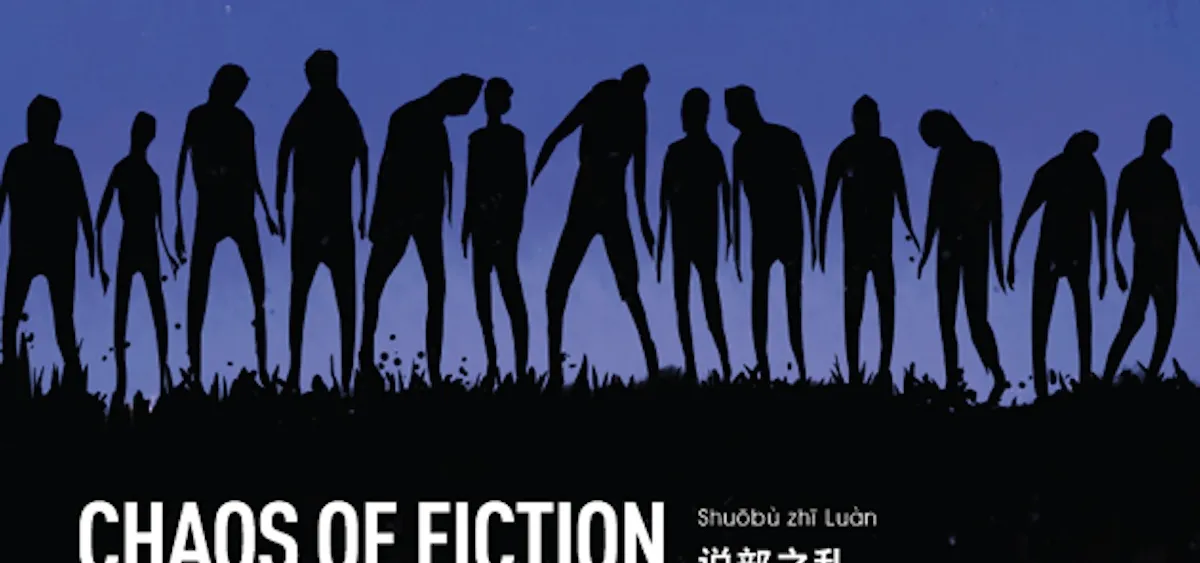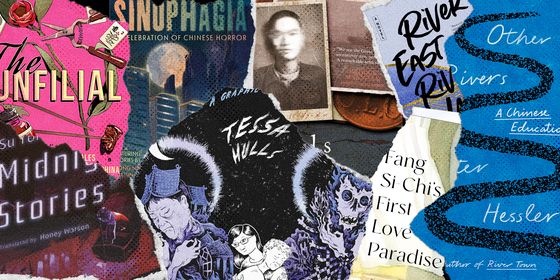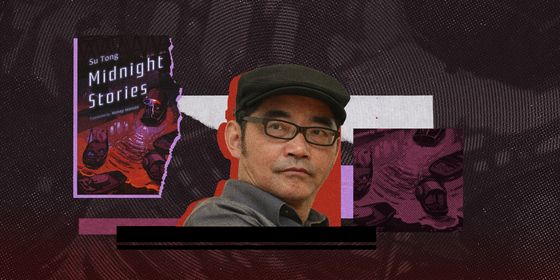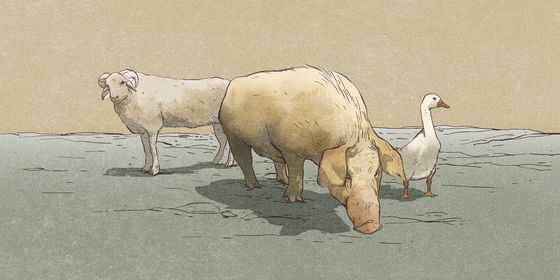The whole incident began long ago with the babbling of a baby boy. The first words out of his mouth were not “mom” or “dad”, but rather complex fragments, such as “it makes no difference”, “all through you” and “ugh, sir!”, which naturally stunned his parents. They believed that people secretly introduced the baby to these […]
The whole incident began long ago with the babbling of a baby boy. The first words out of his mouth were not “mom” or “dad”, but rather complex fragments, such as “it makes no difference”, “all through you” and “ugh, sir!”, which naturally stunned his parents. They believed that people secretly introduced the baby to these words, so they decided to move him to a relatively isolated environment. However, the boy’s language proficiency grew of its own volition, seemingly free of any external control. He began to articulate complicated sentences: “The driver gazed at me, sighing and astonished,” “I shouted savagely,” “You are certainly out of your mind,” and “I am alone, and they are EVERYONE.” The frightened parents took the boy to various specialists, from otolaryngology to neurology, to have him studied inside and out. Without any accompanying symptoms, not a single doctor could find anything wrong with the boy. With modern medical science exhausted, the couple turned to witch doctors, shamans, and priests; they provided all kinds of explanations but they still couldn’t cure the boy.
After many futile attempts to remedy the situation, the child’s father started to record every single word the boy said. He had a vague idea that all these words belonged to an integrated system. He also began to show the record to everyone he knew. Finally, a long-parted friend who came back from overseas saw it and told them the origin—the novel Notes from the Underground by Fyodor Dostoyevsky. The friend even fetched an old translation from the library and marked everything the boy said. But the boy was far from a prodigy—he simply recited these sentences randomly and mechanically without comprehending them.
The story attracted extensive attention when it was exposed. People were baffled by this seemingly supernatural phenomenon. Psychologists, linguists, philosophers, geneticists, and even experts in artificial intelligence participated in the study. Eventually, the only explanation from the standpoint of science was a “coincidence”, which really equaled no explanation at all. The expert opinion was no more than “continue observation”; implying, “until you are tired and forget all about it.”
However, the incident quickly grew beyond the experts’ expectations. Notes from the Underground recited by a baby boy was just an early sign, much like a mysterious crack on a cup’s rim. Soon, people discovered that the boy was not alone, as another odd case surfaced. An old, dying man on a hospital bed recited entire passages from Wuthering Heights while half conscious. His family testified that he rarely read any novels.
It is said that to name an inconceivable thing can somehow suppress its power. Based on this belief, the medical world gave the “disease” a beautiful name: romantism. In the beginning, the term was only used in the professional field, but the situation soon worsened, turning it into a household name. People who involuntarily uttered excerpts from fictions, victims of romantism, increased in number. Besides reciting sentences, their consciousness was seemingly invaded and occupied by different fictional worlds. The patients would fall into a sleepwalking state. Left unattended, they could still find water and food out of instinct. But, they would remain listless and senseless, without ever being conscious or self-aware again. The disease spread rapidly and became unstoppable. No one was able to find the cause; therefore, nothing could be done for prevention or treatment. People began to blindly destroy fiction books and fled in all directions. All patients were strictly quarantined. However, none of these efforts were effective. In a matter of a few years, the entire world gradually collapsed.
We obtained all the above information from the newspapers of the time much later, which inevitably contain elements of imagination. As to how we, LuDe and myself, managed to escape, it was a mystery. It, perhaps, was because we were far enough from human civilization at the time, both physically and psychologically.
In the first few years after the disaster hit, we were in an unmanned area of the western region, living a life of seclusion. This was thanks to Lu De, who accidentally discovered a legend in the historical records about the ancient Tuvas. Lu De’s discovery was that a black dragon once broke out of the ground to terrorize the Tuvas; even their sorcerers ran out of tricks to defend against it. At that moment, a wandering monk happened to pass by this wild land. He subdued the black dragon and sealed it underground with a small talisman. The Tuvas all vanished around the fourth century, but the legend aroused Lu De’s intense interest.
He believed that the black dragon was in fact petroleum erupting, which indicated a possibly rich oil reserve in the land on which the Tuvas had lived. He urged his friends to investigate, but they all dismissed him as a crackpot—such legends were common in various ancient civilizations and were not concrete proof of anything. However, Lu De was persistent in this theory, even somewhat obsessed. He was the kind of person who was intent on destroying his own idealism with failures, but he could never succeed. The reason I agreed, immediately, with Lu De to venture into the untamed land at the time was down to severe misanthropy induced by a failed relationship. I just wanted to go to a trackless, wild land as soon as possible to hide.
It was a futile attempt toward archeology and discovery—there was only desert. Lu De ended up with nothing, but my wish to be left alone was granted. I thought we were sufficiently prepared, but later our supplies were exhausted and passing caravans disappeared. We almost became savages. Faced with this brutal reality, Lu De had to compromise and agreed to return to civilization, replenish our supplies, and resume the expedition. After the great difficulties inherent in returning to the city, we found it wracked beyond recognition by romantism. We spent more than a year looking for our family and friends, but they had already fallen into oblivion among the chaotic sea of people. As a matter of fact, along with the confusion of human consciousness, the world appeared to be dislocated as well. In our city, large groups of foreigners with romantism were seen in every corner. Later we realized that it was the result of a great civil disorder and large-scale exoduses around the globe. They poured into the city on a tide of insanity. When the tide receded, they were left stranded like scattered rubbish.
We decided to settle down before considering the next move. So, we picked a university campus as our temporary base and drove all the sleepwalking people infected with romantism away. We managed to find a generator to restore the power supply to the campus.We stored bottled water, petrol, gas tanks, medicine, all kinds of food, tobacco, coffee, and even alcohol. We had an old pick-up truck that we could drive around to gather the things we needed. One day, without premeditation, we picked two unkempt girls from the street. After they were tidied up, the two girls looked pale, fragile, and in a daze, with empty eyes and slight frames, almost like a pair of dolls. The only difference was that they still had basic survival instincts and mobility. They could speak, but all they said were inscrutable sentences from unrecognizable fictions.We took the girls in, and not just because of our lust.Our desires were reduced to sand in the untamed wilderness. Perhaps we were just trying to create illusions of life through the presence of women. That was also the day that Lu De went for a drive at sunset and returned late at night with a rifle and two boxes of bullets—who knows from where.
We turned two spacious top-floor offices in the main building into bedrooms and lived there with our respective female partners, like two small families. Just like that, we settled down on the campus. Lu De was up very early everyday, had breakfast, and went to the big school library to “do research”. At noon, he would get a bite on the bench outside the library and work until half past five, only resting during the weekend. I was puzzled by his insistence on keeping regular hours. He then explained to me in great detail about his motives. As a matter of fact, his reasons were simple. He believed that our existence had lost all frame of reference. Therefore, saving the human race was the only meaningful thing left to do. Since the disaster originated in books, he believed the solution to be in books—those books stacked in the library. This idealist with infinite energy invited me to work with him, just as we did in the desert. However, I was unmoved by his words. I didn’t believe in “meaning”. To me, the world is a grand enigma, and we are just subtle branches within it—like the stream deep in an abyss shrouded by thick fog; all we have to do is to flow in silence and roll with the tides.
A short while later, Lu De proposed a plan of salvation to me. His strategy was as follows: put together all the possible sentences that could have been said by a normal person in their entire life; then he would construct a novel using these sentences. When this novel occupied the conscience of a subject, this person would be able to master the language of a normal person. Lu De was looking through books such as Daily English 900 to find examples. After gathering all possible permutations, he would start on the novel.I had to point out that the plan wouldn’t have any real effect, because though the number of sentences a person utters during their lifetime is limited, the permutations are infinite; to put it in another way, a person masters not just sentences, but a core method for generating sentences. Lu De agreed that I was right. Unable to contain his disappointment, he aborted his plan to create an “example sentence novel”. After that, he proposed many other plans of salvation, but all failed to stand up to even the most cursory scrutiny. His moods rose and fell dramatically with increasingly long hours spent in the library. He gradually became a stranger to me.
I had chosen an alternative way of life. The assignment I put myself to was “to patrol”. Twice every morning and evening, I walked along the quiet boulevard to watch over the entire campus with an Akita dog I picked up from the streets for company. After I finished with the patrol, I would spend a little extra time taking a walk on the empty school sports field. Along the racetrack, I walked in circles without thinking about anything. There used to be a well-kept lawn encircled by the racetrack. Now, only a few spots of wild grass were left. Sometimes, I would take my female companions and set them in the stands, letting them enjoy the sunshine. In the afternoon, I loved to spend time in a garden tucked in a corner of the campus. The garden may have belonged to botany or horticulture students. There was also a small glass green house outside, which held a board of withered Chinese peony surrounded by excessively growing wild grass. Creepers covered the walls. Under the evening twilight, the glass room reflected a faint yellow luster. The field of flowers, though faded and decayed, was still able to display distinctive layers of color. Before the afterglow died, I would start my evening patrol.
I also liked to pick a book or two from a small bookstore close to the library, taking them back to my bedroom and flipping through the pages in bed. I would return them once I’d finished. I never set foot inside the library for a book, as I was terribly afraid of the place. It was the territory of the mad Lu De. From time to time, for some reason, I would imagine the library as a giant aquarium and Lu De as a latent sea monster in one of its deep tanks.
Another pastime was listening to my female companion reciting long passages from different novels,like a radio broadcast—all while steady patterns of rain and night roared with wind.
“As the train left the station, Robert tarried at the window of his compartment and took a last unemotional look at the island shrouded in a pale, reddish grey mist, and at the sea, where the violet afterglow of the setting sun floated in distant waves…”
“A camp in the open, a countless number of men, an army, a people, under a cold sky on cold earth, collapsed where once they had stood…”
“The three of us remained silent for a while; blankly standing by the gate, staring at the lawn ran riot and the dry, old pond…”
These words were uttered by my female companion, sounding alien and pleasant. She gazed straight ahead, her expression calm and peaceful; her consciousness seemed to be locked away in a fictional world created by novels. But how could I be sure that I was free? Perhaps I was in the middle of a fiction as well, revisiting the same paragraph again and again.
I used to be keen on literature. In many cases, I could recognize a novel by just a few sentences. However, I had no idea about the fictions my female companion sang. Most of them were obscure to me; after all, there are too many novels in the world.
Winter replaced summer. Just like that, we spent two years on the school campus. It could be said that I enjoyed the distinctive tranquility of surviving the apocalypse, until one gloomy winter afternoon when Lu De came to me to propose his latest theory.
Lu De was emaciated due to his lengthy stays in the library. His skin had become unhealthily pale. He wore his hair long and his eyes were red. The way he spoke sounded nervously excited. Extensive reading over the two years had greatly enhanced his literary merit, making his theory sound delightful and well-versed.
He asked me to read through “The Chamber of Statues” by Jorge Luis Borges carefully. The story states that, in Andalucía, there was a strong castle with gates that were always locked. Every new king to the throne would add a new lock to the gate. A usurper later ordered the locks removed against the advice of the court and entered the impenetrable castle. In its first room, there were many metal and wooden carvings of Arabic figures. In its last room on the back wall, an inscription could be found, stating that any intruder would be overtaken by warriors that looked like the statues. Before long, the kingdom was indeed conquered by the Arabs. Borges added a note at the end of the story, stating that it was based on the story told on the 272th night of A Thousand and One Nights.
“What’s the point?” I asked, unable to put my finger on it. Lu De immediately passed me a copy of the Outlaws of the Marsh, asking me to read the first chapter “Zhang the Diving Teacher Prays to Dispel a Plague, Marshal Hong Releases Demons by Mistake”, in which Marshal Hong discovered the Suppression of Demons Hall during his visit to a mountain. A dozen seals crossed and overlapped each other on the gate to the hall. The accompanying abbot explained to him: “A Divine Teacher known as the Royal Master of the Way locked the demons in there in the age of the Tang. Each subsequent Divine Teacher added his own seal, prohibiting any successor from opening the doors. If those demons escaped, it would be awful.” Marshal Hong didn’t believe the abbot and opened the gate against his advice, releasing the demons inside.
Lu De then passed me a third fiction, Life: A User’s Manual by French writer Georges Perec. On the 20th page, Perec retold the small story of Borges with a larger background: When every king dies and a new king comes to the throne, he would add a new lock to a gate, resulting in 24 locks, each representing a king.
After I finished reading, Lu De presented his theory. From A Thousand and One Nights to Outlaws of the Marsh, from Borges to Perec, why did they retell the same story of adding a lock or seal? It was very likely that, by writing the novel, they were performing the action of “adding a lock or seal”. They were trying to contain the “demon of fiction”. Originally, fiction was printed on paper, static like statues. Without a seal, they would become dynamic, even alive, invading people’s minds and running rampant. The breaking of the seal led to the great disaster we were experiencing. In order to save mankind and squash the chaos induced by fiction, one had to carry on the work of the author of A Thousand and One Nights, Shi Nai’an, Borges, Perec and many others like them, to retell the story of adding a lock or seal.
When Lu De presented his strange, absurd theory,I was already working on refuting him. I reminded him of the fact that Borges had read Shi Nai’an and even wrote an article about him once. As to A Thousand and One Nights and the 127th night’s story, it could be a pretext. Borges certainly could have done it. So, the story could very well originate from the Outlaws of the Marsh, and all Borges had done was to give it a new look. As to Perec, he was just parodying Borges. Everything could be simply explained. Lu De’s idea about the seal was too outrageous and entirely unscientific.
To my surprise, Lu De seemed to have little confidence in his latest theory. All the nervous excitement and passion was bluster. My counter argument soon diminished his willpower. He fell into silence like a ball of flame suddenly extinguished. It began to snow that very night and didn’t stop until the next morning. I woke up languid and sensitive to the chill; I felt like I had a nasty cold. I took my temperature, which confirmed a low fever. I got some medicine from the classroom-turned-warehouse and lay huddled up in bed, skipping the patrol. At almost noon, I heard a crisp, loud gunshot. I anxiously tilted my head to one side, and heard one gunshot after another from the top of the main building in which we resided. Could it be enemies? I sprang up, throwing off the blanket and rushing out of the room.
On opening the small door to the roof, cold air filled my nostrils. Large flakes of snow poured down,blurring my sight. But I immediately saw Lu De, laying on his stomach on the snow covered ground and shooting in the air. It was in the direction of the sports field, already a vast expanse of whiteness.
“Who are you shooting at?” I asked.
“I was shooting at the snowflakes; they are endless,”said Lu De.
“Don’t freeze yourself,” I said.
“I don’t care.” He sat up and smiled a little at me.
“Come down with me and we’ll eat something hot together.”
“No, thanks. I want to stay for a while.”
“Okay.”
I returned to my room, somewhat worried. But the gunshots completely died down. It was clear to me that his hopes were only wild, feckless fantasies. When they burst, all that would be revealed would be sharp, unforgiving reef. Right now, Lu De had to learn to live with, even gaze into, this reef.
After taking the cold medicine, I became drowsy and soon fell into deep sleep. The uneasiness turned into disturbing nightmares. At last, I was awoken by a loud noise, unflustered this time. I carefully got dressed and slowly strolled to the roof. The snow had stopped. On the horizon, a corner of a dark cloud lifted, revealing a bright red setting sun. I found Lu De in a pool of blood in a corner. He was already dead. He sat down, pointed the gun to his chin and pulled the trigger.
Later, I attempted to carry on with my old pattern, but every time I passed the now dark library during patrol, I sensed a vague restlessness. The ghost of Lu De seemed to linger inside. I now know that the peaceful illusion I built over the last two years had shattered into pieces with that gunshot. Every time I recalled Lu De’s suicide, I always wondered: if a person knows that he has only two or three hours left, would the world, in his eyes, turn into a sort of film or novella?
I tried not to contemplate the fact that “I was the only person left with consciousness”, but I could no longer live an easy life. I considered the idea of moving away from the campus, to look for a wild, primitive beach to build a small cabin and reconstruct the peaceful illusion. However, I felt that I had to complete a mission before I left, otherwise, Lu De’s spirit would keep haunting me. This was a subtle sense of responsibility. So, I took in the last theory of Lu De, and started to write a story of “adding a lock or seal”. I would run away as soon as it was complete. At this moment, the beach in waiting flicks in front of my eyes—the musky tide slaps against the bare reef, roaring to remind me to gaze into it. – TRANSLATED BY LIU JUE (刘珏)
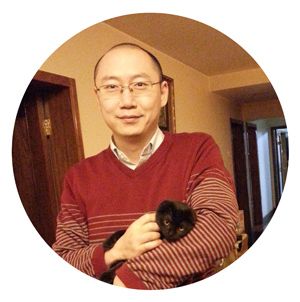 Author’s Note: I came up with this story when I was working as an editor in a publishing company. Immersed in fiction every day, I would end up reading lengthy novels like Look Homeward, Angel by Thomas Wolfe three or four times. My mind seemed to be somewhat eroded by them. The atmosphere in my office was cold and indifferent, and I rarely talked to my co-workers. I only knew that they were also reading all kinds of novels. Such depression led to despair, but I found a plus side to the despair; it gives you a clear head, as it is what’s left after the illusions of life shatter. However, it was also hard to endure. This is probably the inspiration for “Chaos of Fiction”. In addition, the similarities between certain plots, and the adding of a seal in Outlaws of the Marsh, as well as the story about the locked gate told by Jorge Luis Borges gave me inspiration for the story.
Author’s Note: I came up with this story when I was working as an editor in a publishing company. Immersed in fiction every day, I would end up reading lengthy novels like Look Homeward, Angel by Thomas Wolfe three or four times. My mind seemed to be somewhat eroded by them. The atmosphere in my office was cold and indifferent, and I rarely talked to my co-workers. I only knew that they were also reading all kinds of novels. Such depression led to despair, but I found a plus side to the despair; it gives you a clear head, as it is what’s left after the illusions of life shatter. However, it was also hard to endure. This is probably the inspiration for “Chaos of Fiction”. In addition, the similarities between certain plots, and the adding of a seal in Outlaws of the Marsh, as well as the story about the locked gate told by Jorge Luis Borges gave me inspiration for the story.





